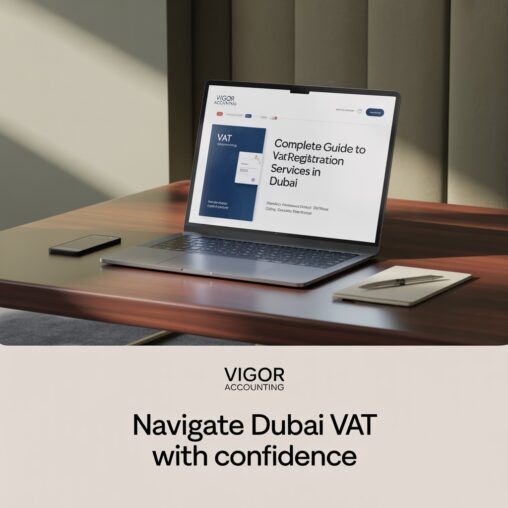Starting a business in Dubai is exciting, but navigating the financial landscape, especially VAT, can be daunting. Introduced in 2018, the UAE’s Value Added Tax (VAT) system is a 5% consumption tax on most goods and services. Understanding VAT is crucial for compliance and financial planning.
Mandatory vs. Voluntary VAT Registration
Mandatory Registration:
- Businesses with taxable supplies exceeding AED 375,000 annually must register for VAT.
Voluntary Registration:
- Businesses with taxable supplies or expenses over AED 187,500 can opt to register, allowing them to reclaim input VAT.
Understanding these thresholds helps businesses decide when and how to register, ensuring compliance and potential tax benefits.
Step-by-Step VAT Registration Process in Dubai
Step 1: Create an EmaraTax Account
- Visit the FTA website and register using your email and UAE Pass for authentication.
Step 2: Set Up a Taxable Person Profile
- Provide business details, including trade name and contact information.
Step 3: Initiate the VAT Registration Application
- Select the appropriate registration type (mandatory or voluntary).
Step 4: Complete the VAT Registration Form
- Enter business activities, expected turnover, and upload required documents.
Step 5: Submit and Await TRN
- After submission, the FTA will review and issue a Tax Registration Number (TRN) upon approval.
This streamlined process ensures businesses can efficiently register and comply with VAT regulations.
Key Documents Required for VAT Registration
- Trade License: Proof of business legitimacy.
- Passport and Emirates ID: Identification for business owners.
- Financial Statements: Evidence of turnover and expenses.
- Lease Agreement or Utility Bill: Proof of business address.
- Bank Account Details: For VAT transactions.
Having these documents ready ensures a smooth registration process.
Common Challenges and Mistakes in VAT Registration
- Incomplete Documentation: Missing or incorrect documents can delay registration.
- Misunderstanding Thresholds: Confusion between mandatory and voluntary registration criteria.
- Delayed Registration: Late applications can result in penalties.
- Incorrect Business Activity Classification: Misclassifying activities can lead to compliance issues.
- Post-Registration Compliance and Responsibilities
Once a business completes VAT registration in Dubai, that’s only the beginning. Staying compliant with the Federal Tax Authority (FTA) regulations is crucial for avoiding fines and ensuring business continuity. Post-registration responsibilities are multi-layered and require careful attention.
VAT Return Filing:
Registered businesses must file VAT returns, usually every quarter, through the FTA portal. Each return must detail output tax (VAT on sales), input tax (VAT on purchases), and the net VAT payable or refundable. Missing deadlines can result in hefty penalties, so businesses need to mark their calendars and maintain regular reporting schedules.
Timely Payments:
Alongside return filing, paying VAT on time is non-negotiable. The FTA provides a payment reference number (PRN) that should accompany every payment to ensure it’s properly credited. Delayed payments not only attract fines but also harm a business’s credibility.
Record Keeping:
All VAT-registered businesses must maintain comprehensive records, including sales invoices, purchase invoices, credit notes, debit notes, import and export documentation, and bank statements. These records must be preserved for at least five years and be readily available for audits or inspections.
Proper Invoicing:
VAT-compliant invoices must be issued for every transaction, featuring key elements like TRN, invoice number, date, customer details, and VAT amounts. Mistakes in invoicing can create confusion and compliance issues.
By staying vigilant and organized, businesses can meet all compliance obligations efficiently, build trust with clients, and avoid unnecessary disruptions.
VAT Services in Dubai: Choosing the Right Provider
With so many responsibilities post-VAT registration, many new businesses turn to VAT service providers to handle the intricacies. Dubai’s market is full of VAT consultants, but not all are created equal.
Why Professional VAT Services Matter:
The VAT laws in the UAE are evolving, and staying current is a full-time job. Experienced VAT service providers help businesses interpret and apply these laws correctly. They reduce the risk of fines, help optimize VAT deductions, and ensure returns are filed error-free.
How to Choose the Right Provider:
- Experience: Look for firms with a proven track record in UAE VAT regulations.
- Transparency: Ensure they’re upfront about fees, deliverables, and timelines.
- Support: Opt for providers who offer ongoing consultation, not just one-time setup.
- Tech Savvy: Those using modern accounting tools make compliance much smoother.
Cost vs. Value:
Cheaper isn’t always better. A competent VAT services provider might cost more upfront but can save a business from massive fines and lost deductions in the long run.
Spotlight on Vigor Accounting
Vigor Accounting stands out as a reliable partner for businesses navigating the complexities of VAT Registration Services in Dubai. But what makes them different?
Industry Expertise with a Local Edge:
With deep knowledge of UAE’s tax landscape and hands-on experience across multiple industries, Vigor Accounting delivers VAT services that are both practical and compliant. Whether it’s helping a startup with its first VAT return or advising a seasoned firm on zero-rated supplies, they bring clarity and precision.
Personalized Service:
Unlike one-size-fits-all firms, Vigor takes the time to understand each client’s business model. This allows them to tailor VAT strategies that not only ensure compliance but also enhance tax efficiency.
End-to-End VAT Support:
From initial registration to ongoing filing and advisory, Vigor Accounting covers it all. Their team helps with:
- VAT audits
- Error rectification
- De-registration
- VAT training for internal teams
Reputation and Trust:
The firm is known for its transparency, quick turnaround, and friendly yet professional communication. Many startups in Dubai consider them a one-stop-shop for all things VAT.
By working with professionals like Vigor Accounting, businesses can focus on growth while staying compliant and stress-free.
VAT Registration in UAE: Beyond Dubai
While Dubai is the business hub of the UAE, VAT registration is a federal process, and each emirate has specific considerations. It’s essential to understand the nuances based on your location and operational model.
Across Emirates:
Whether you’re setting up in Abu Dhabi, Sharjah, or Ras Al Khaimah, the core VAT rules remain the same. However, the supporting documentation and licensing procedures may vary depending on the local authority and free zone rules.
Free Zones vs. Mainland:
Businesses in designated free zones may enjoy zero-rated transactions between free zones, but once they deal with the mainland, standard VAT applies. Understanding these differences is critical to proper VAT treatment of sales and purchases.
Offshore Companies:
Typically, offshore entities are not required to register for VAT unless they conduct taxable activities within the UAE. Misinterpreting this can lead to compliance headaches later.
Branch Offices and Multi-Location Firms:
If a company operates in multiple emirates, VAT registration is done under the head office, but the return must reflect emirate-wise revenue allocation.
Understanding VAT Penalties and Fines
No one wants to start their business journey with fines and penalties, yet many do due to ignorance or oversight. Here’s what you need to watch out for.
Late Registration Penalty:
Failing to register on time can cost AED 10,000. If you’re unsure about your turnover or eligibility, consult a VAT expert to avoid unnecessary fines.
Late Return Filing:
There’s a AED 1,000 fine for the first offense, increasing to AED 2,000 for subsequent late filings within 24 months. This is in addition to daily penalties for continued non-compliance.
Incorrect Returns:
Filing an incorrect VAT return without voluntary disclosure can result in penalties ranging from 5% to 50% of the unpaid tax. Always double-check data before submission.
Non-Issuance of Invoices:
Not issuing proper VAT invoices can result in AED 5,000 per instance. Ensure your invoicing system is up to date and aligned with FTA guidelines.
Other Penalties Include:
- Failure to display VAT-inclusive prices
- Non-maintenance of records
- Not informing the FTA of changes in business details
Avoiding these penalties comes down to awareness, preparation, and partnering with a professional VAT consultant when in doubt.
VAT Exemptions and Zero-Rated Supplies
Not all goods and services in the UAE are subject to the standard 5% VAT rate. Some are either exempt or zero-rated, and knowing the difference is crucial for accurate VAT registration and compliance.
Zero-Rated Supplies:
These are taxable at 0%, meaning VAT is charged at 0%, but input VAT can still be recovered. Examples include:
- Export of goods and services outside the GCC
- International transportation
- Certain healthcare and educational services
Exempt Supplies:
These are non-taxable, and businesses cannot recover input VAT on related expenses. Common exempt categories include:
- Residential property leases (after first supply)
- Local passenger transport
- Certain financial services
Implications for Businesses:
If your business provides a mix of standard-rated, zero-rated, and exempt supplies, VAT accounting becomes more complex. You’ll need to segregate input VAT and only reclaim eligible portions, which can affect profitability.
This distinction also determines whether VAT registration is beneficial. For example, a business dealing solely in exempt supplies might not benefit from voluntary VAT registration.
Understanding how exemptions and zero-ratings apply to your offerings is essential for accurate reporting and optimized VAT recovery.
Impact of VAT on Business Operations
Introducing VAT into your financial ecosystem affects nearly every part of your operations—from pricing to supply chain to client billing.
Pricing Strategy:
You must decide whether to display VAT-inclusive or exclusive prices. Businesses selling to consumers often include VAT in final prices, while B2B firms may show it separately.
Cash Flow Considerations:
VAT is a tax on consumption, but the business must collect and remit it. This means you might face a cash flow gap if your clients delay payments. Strategic invoicing and diligent payment follow-ups help balance cash flow.
Supplier Relationships:
Choosing VAT-registered suppliers may allow for input VAT recovery, potentially lowering your costs. Hence, VAT affects procurement strategies.
Client Perception and Communication:
Transparent communication with clients about how VAT affects pricing builds trust and avoids disputes. Include proper disclosures on quotes and invoices.
Internal Processes:
VAT registration pushes businesses to formalize their accounting, adopt digital systems, and maintain better financial discipline. It often leads to broader financial improvements.
Leveraging Technology for VAT Compliance
With so many moving parts in VAT compliance, technology is your best friend. Adopting the right tools can simplify operations and reduce human errors.
Accounting Software:
Solutions like Zoho Books, QuickBooks, and Tally ERP 9 are VAT-compliant and integrate with the FTA portal. They help automate:
- Invoice generation
- VAT computation
- Filing VAT returns
- Tracking input/output VAT
Document Management Systems:
Maintaining digital records ensures you meet the 5-year retention requirement. Cloud-based systems allow easy access and sharing for audits.
Bank Integrations:
Some accounting platforms connect directly to your bank accounts, pulling in transactions for auto-categorization and VAT mapping.
FTA Portal Use:
The EmaraTax portal is designed for convenience. Familiarizing yourself with its features—like bulk uploads and historical reports—makes life easier during filing season.
By embracing technology, you free up valuable time, reduce costs, and strengthen compliance.
Future of VAT in the UAE
VAT in the UAE is here to stay, but it’s not static. As the business environment matures and digital transformation continues, several developments are likely.
Rate Adjustments:
The 5% rate is among the lowest globally. There’s ongoing speculation that the UAE might raise this rate in the future to increase non-oil revenue. Businesses should prepare their pricing strategies accordingly.
Wider Scope:
More sectors could be brought under VAT. Areas currently exempt—like certain financial services—might see inclusion, tightening the compliance net.
E-invoicing Implementation:
Much like Saudi Arabia, the UAE may mandate electronic invoicing (e-invoicing) to improve accuracy, traceability, and audit readiness.
Greater Automation in Audits:
The FTA is increasingly leveraging data analytics to identify inconsistencies and conduct remote audits. Businesses will need cleaner, tech-backed records.
Staying agile and informed is the only way to adapt to these future changes.
Conclusion and Final Thoughts
Navigating VAT registration services in Dubai might feel overwhelming at first, especially for new businesses. But with the right guidance and tools, it can be a smooth and rewarding process.
From understanding your eligibility to ensuring ongoing compliance, every step matters. It’s not just about registering; it’s about building a financially resilient and legally sound business foundation.
Partnering with experienced firms like Vigor Accounting ensures you’re not just checking boxes—you’re strategically aligning your VAT approach with business growth.
Embrace VAT not as a burden but as a stepping stone to streamlined operations and market credibility.
Frequently Asked Questions (FAQs)
- What is the VAT registration threshold in Dubai?
Businesses with taxable supplies and imports exceeding AED 375,000 annually are required to register. Those above AED 187,500 may register voluntarily. - How long does the VAT registration process take?
It typically takes 5 to 20 business days, depending on documentation accuracy and FTA review times. - Can a business voluntarily register for VAT below the threshold?
Yes, if taxable supplies or expenses exceed AED 187,500, you may voluntarily register to reclaim input VAT. - What are the penalties for late VAT registration?
A fine of AED 10,000 applies for late registration, plus additional penalties for delayed filings or payments. - How can Vigor Accounting assist with VAT registration?
Vigor Accounting provides end-to-end VAT services—from documentation to registration and post-registration compliance—ensuring you’re always ahead of the curve.




